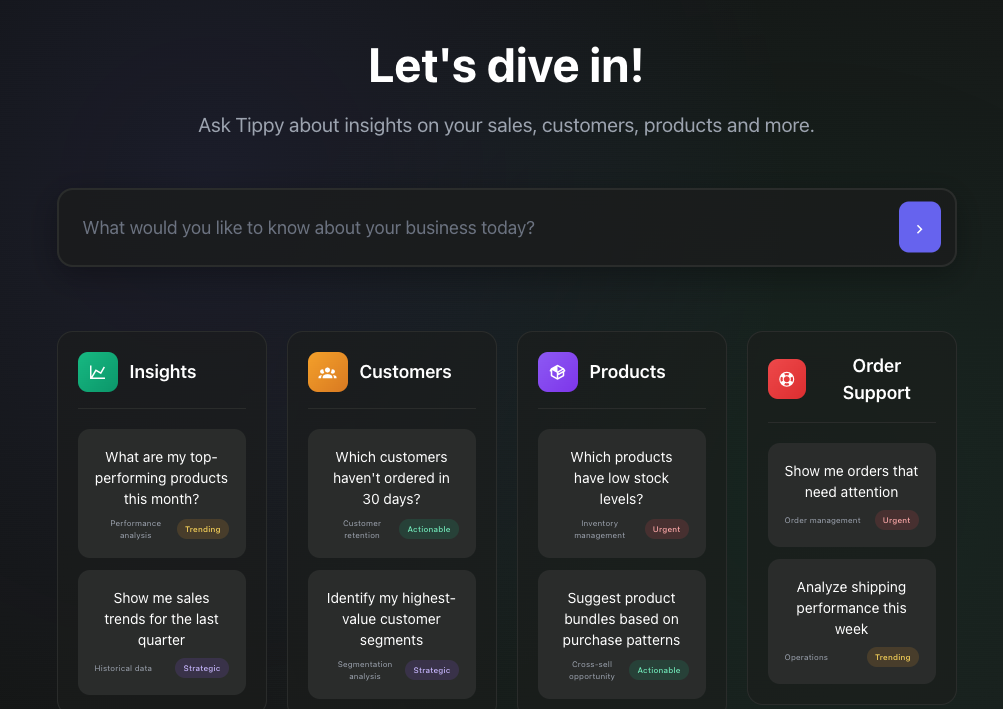How a B2B eCommerce platform helps Soda & Energy Drink Brands grow: 7 Key features
Discover why soda and energy drink brands are turning to B2B eCommerce platforms to streamline their operations, boost sales, and simplify repeat orders.
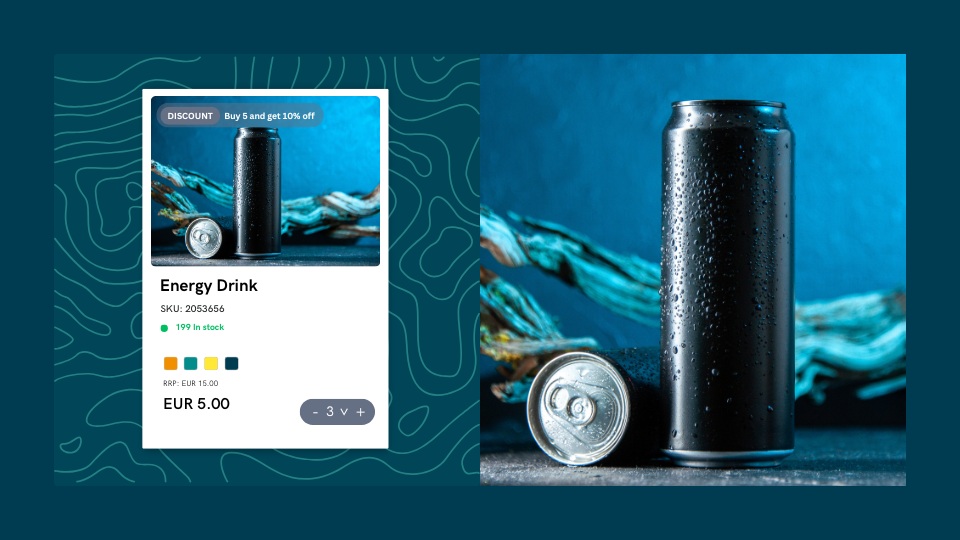
With the rise of eCommerce across industries, the beverage sector, particularly sodas and energy drinks, has embraced digital B2B (business-to-business) platforms to streamline transactions and boost efficiency. As competition heats up, B2B eCommerce is an essential pathway for brands to stand out, making their products accessible and ordering easy for retailers, distributors, and even vending companies. Here’s a look at what makes B2B eCommerce so crucial for soda and energy drink companies and tips on leveraging it effectively.
Using a B2B eCommerce platform increases sales for Sodas & Energy Drinks brands
Traditionally, B2B transactions in the beverage industry involved phone calls, emails, or even face-to-face meetings, which can be time-consuming and error-prone. However, a B2B eCommerce platform brings ease and efficiency, offering key benefits like:
- 24/7 Ordering: Retailers and distributors can place orders any time, accommodating different time zones and preferences.
- Improved inventory management: eCommerce platforms provide real-time inventory updates, helping to prevent overordering and stockouts.
- Customized B2B pricing: B2B platforms allow brands to set custom prices and discounts based on volume, customer loyalty, or market segment.
- Automated processes: With automated invoicing, order tracking, and delivery scheduling, brands and buyers save time and reduce errors.
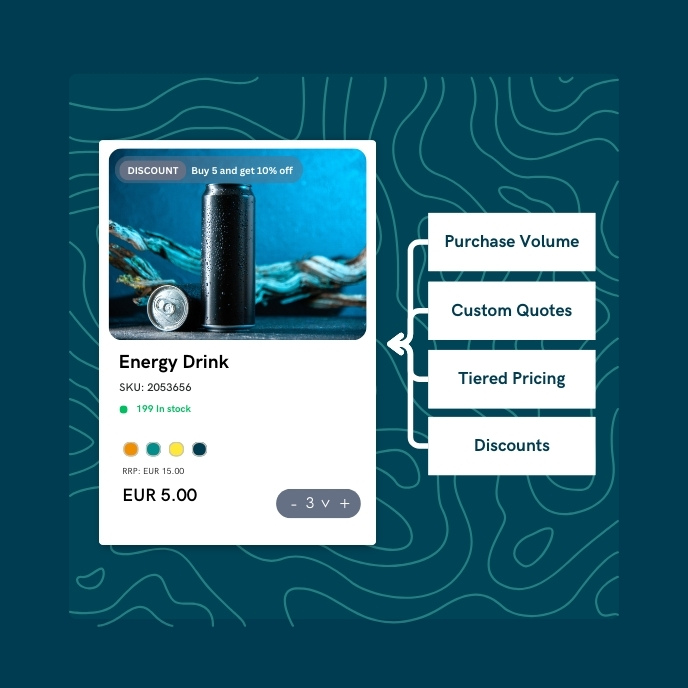
This kind of efficiency is critical for high-demand products like sodas and energy drinks, where swift restocking and precise order management can make a substantial impact on revenue and customer satisfaction.A seamless B2B eCommerce platform helps avoid hiccups during the peak season, ensuring your customers have a smooth and enjoyable buying experience.
Growth and trends in the Soda & Energy Drink industry
1. Market size and growth
- The market is expected to grow at a CAGR of 6.9% from 2024 to 2030.
- Energy drinks are one of the fastest-growing segments in the beverage industry, with a projected compound annual growth rate (CAGR) of 7.2% from 2021 to 2028. This growth is attributed to increased demand for functional drinks that boost energy and alertness.
2. Health and wellness trends
- There’s a growing trend in the reduction of sugar content and an increase in low-calorie or zero-sugar options, as consumers become more health-conscious. This has led brands to innovate by introducing naturally sweetened and organic products in the soda and energy drink categories.
- The natural energy drinks market is expanding, with many brands adopting natural caffeine sources like green tea and yerba mate to meet demand for healthier energy options.

3. Sustainability and eco-friendly packaging
- The shift toward sustainable packaging is crucial in the beverage industry. A report suggests that around 70% of consumers prefer eco-friendly packaging, which influences B2B and retail sales. Brands are investing in recyclable, biodegradable, or reusable packaging options for cans and bottles.
- In the Danish market, for example, there’s a strong emphasis on recycling fees and refunds, which companies incorporate through sub-products like returnable cans or bottles with a deposit, aligning with environmental goals.
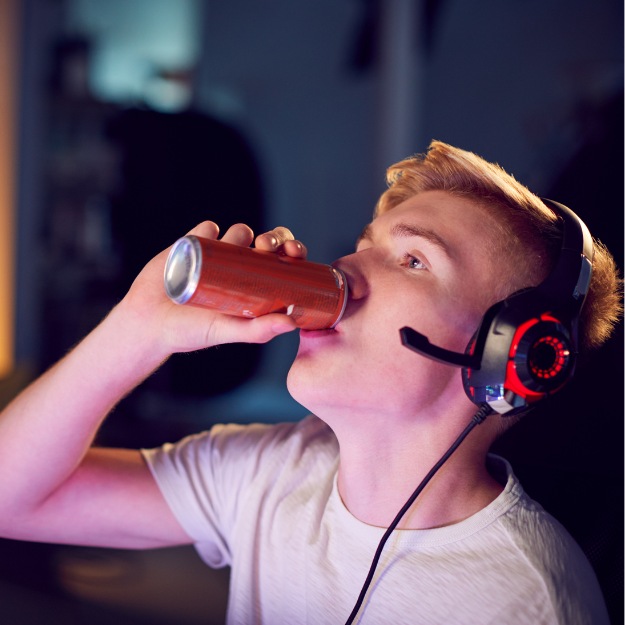
4. eCommerce in the Beverage Industry
- Online sales of beverages grew significantly in recent years, especially post-pandemic, with a steady demand for direct-to-consumer (DTC) and subscription-based models.
- The convenience of subscription services for beverages is in high demand, particularly for products like energy drinks, where consumers expect regular, recurring purchases.
7 Key Features for a B2B Beverage eCommerce platform
To thrive in the digital B2B space, soda and energy drink brands should look for a platform with features tailored to their industry’s needs. Here are some essential capabilities:
- Flexible payment options: The beverage industry often relies on customized payment terms. Offering options like net terms, direct bank transfers, or automated invoicing can help retain customers by making purchases more convenient.on, and easy-to-access links to your B2B eCommerce store. You can read more about Flexible payment options in our article B2B Payment Terms: Choosing the right fit for your wholesale business.
- Product customization: Allow retailers to create bundles or mix-and-match different flavors and sizes, catering to customer preferences without overcomplicating orders.
- Dynamic pricing and discounts: Offer volume discounts and promotional pricing tailored to specific customer types (e.g., vending machine companies, grocery chains, or convenience stores).
- Real-time stock visibility: Retailers need access to live inventory levels to avoid stockouts on popular items, particularly during peak seasons.
- Subscription model for recurring orders: With a recurring subscription model, brands can set up automatic deliveries for retailers. This feature is ideal for consistent sellers who want to ensure regular restocks without manual reordering, creating reliable, recurring revenue.
- Subproducts feature for market-specific fees: For markets like Denmark, where products like cans and bottles come with an additional refundable fee, Turis’ Subproducts feature lets brands automatically apply these fees at checkout. This enables brands to include deposit amounts and simplify the process for both customers and retailers.
- Multi-Channel Integration: Integrate seamlessly with ERP systems, CRMs, and shipping providers to centralize operations and improve logistics.
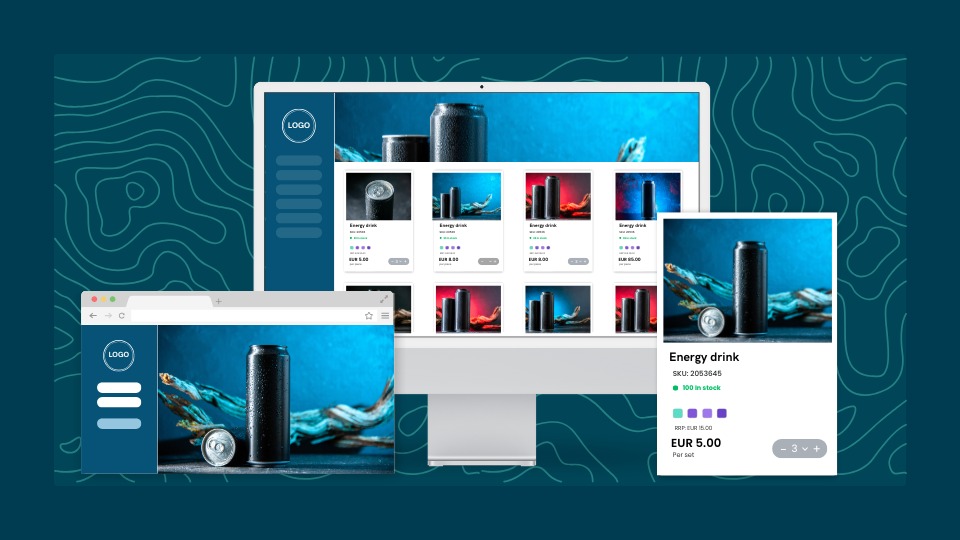
How to increase sales with a B2B eCommerce platform for Sodas & Energy Drinks brands
Implementing a B2B eCommerce platform isn’t just about efficiency; it’s also an opportunity to drive sales growth. Here are some strategies that can help soda and energy drink brands maximize revenue:
Customer segmentation: Create different buying experiences based on customer types—wholesalers, vending operators, or retail chains. Each segment can have a tailored product list, discount structure, and payment terms.
Seasonal promotions: Tie promotions to peak sales periods (e.g., summer, holidays, sports seasons) when demand is highest. Offer discounts on bulk orders or specific flavors to help retailers stock up.
Introduce new products easily: Use your eCommerce platform to launch new flavors or product lines. Highlight these products on the storefront, and offer samples or introductory discounts to encourage trial among loyal customers.
Reorder reminders and automation: By analyzing order history, you can send reorder reminders or enable auto-replenishment, ensuring popular items remain stocked without manual intervention.
Using data to making informed decisions
With B2B eCommerce, soda and energy drink brands can collect valuable data on sales patterns, inventory turnover, and customer preferences. Leveraging these insights can lead to smarter decisions, including:
Product development: Observe trends in popular flavors or package sizes to inspire new product ideas or adjustments to the current lineup.
Demand forecasting: Use order data to forecast demand, helping you optimize production and avoid stock issues.
Personalized marketing: Analyze purchasing behaviors to deliver personalized marketing and promotions to top buyers.
Why choose Turis for your B2B Beverage eCommerce business?
Platforms like Turis provide essential tools and flexibility for soda and energy drink brands looking to streamline their B2B operations. With features like real-time inventory tracking, custom pricing, and integration capabilities, Turis ensures that brands can handle high order volumes efficiently while offering a personalized experience. Additionally, Turis’ no-code customization allows brands to keep their digital storefront fresh and aligned with their marketing campaigns without requiring technical expertise.
Related articles
START FREE TRIAL
Start generating more B2B orders today
Get a free preview. Import products from your B2C store

